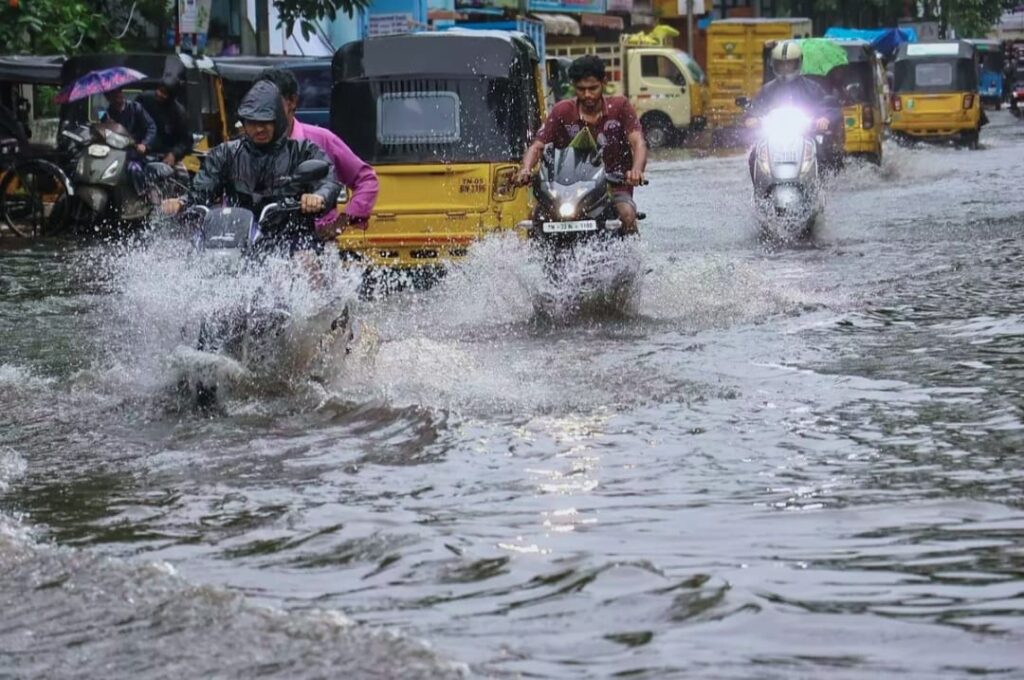
Cyclone Fengal has wreaked havoc in Puducherry and parts of Tamil Nadu, with record-breaking rainfall and extensive flooding disrupting daily life. The Union Territory of Puducherry recorded 48.4 centimeters of rainfall in 24 hours as of 8:30 am on December 1, the highest 24-hour cumulative rainfall in three decades (1995–2024), according to the India Meteorological Department (IMD).
The deluge has led to a flood-like situation in Puducherry, inundating arterial roads and residential colonies. Transportation services have been severely impacted, with rescuers navigating waterlogged streets to evacuate stranded residents and deliver essentials like food and drinking water.

The Situation in Puducherry
The relentless rain caused water levels to rise to five feet in some residential localities, forcing ground-floor occupants to seek refuge on higher floors. Hundreds of trees have been uprooted, and densely populated areas have turned into islands of isolation, with knee-deep water making movement difficult.
Puducherry Chief Minister N. Rangasamy inspected flood-hit areas on Sunday, stating, “Puducherry has received 50 cm of rainfall, resulting in severe flooding. Rescue teams are working tirelessly to evacuate those stranded in the floodwaters.”
Despite the overwhelming challenges, officials reported no significant structural damage to buildings or public infrastructure in the Union Territory. However, the impact on daily life has been severe, with prolonged power outages, limited access to clean water, and disrupted transportation compounding residents’ hardships.
Tamil Nadu Faces the Cyclone’s Fury

Tamil Nadu has also borne the brunt of Cyclone Fengal, with heavy rains battering districts such as Chennai, Chengelpet, Kanchipuram, Villupuram, and Tiruvallur. Chief Minister M.K. Stalin visited affected areas in Kolathur Assembly constituency on Sunday, where officials confirmed ongoing rescue operations in multiple flood-hit regions.
In Chennai, three people tragically lost their lives due to electrocution in rain-related incidents. Health Minister Ma Subramanian announced the establishment of 500 medical camps in flood-affected districts to address immediate health concerns.
Local authorities have evacuated hundreds of residents from low-lying areas to temporary shelters. Emergency response teams, supported by disaster management personnel, are working tirelessly to ensure the safety of those at risk.
IMD Updates and Future Projections
The IMD reported that Cyclone Fengal, which made landfall in Puducherry and coastal Tamil Nadu, is expected to weaken into a deep depression within a few hours. The system is likely to continue its west-southwestward trajectory, bringing heavy rainfall to Tamil Nadu until December 2.
Meteorologists highlighted a critical factor exacerbating the flooding: high ocean tides that have prevented rainwater from draining into the sea. A senior IMD official noted, “The cascading effect was severe. Once the rains stop for a few hours, and water begins to drain, the situation will improve.”
Damage and Disruption
The cyclone-induced downpour caused widespread disruption in Tamil Nadu’s capital, Chennai. Electric Multiple Unit (EMU) train services, which were suspended on Saturday due to waterlogged tracks, resumed normal operations on Sunday. Suburban commuters faced delays, but services are expected to stabilize as water recedes.
In rural areas, extensive agricultural damage has been reported, with fields inundated and crops destroyed. Farmers in regions like Kanchipuram and Villupuram are counting their losses, as the heavy rainfall came at a critical time for standing crops.
Meanwhile, urban infrastructure in Chennai struggled to cope with the deluge. Roads and flyovers in key commercial hubs remained submerged, and residents expressed frustration over the city’s inadequate drainage systems.
Relief and Recovery
The government has launched extensive relief efforts in the wake of Cyclone Fengal. Apart from medical camps, temporary shelters have been set up to house those displaced by the floods. Food and clean drinking water are being distributed by state and local authorities, with NGOs stepping in to assist in hard-to-reach areas.
Public health officials are also working to prevent outbreaks of waterborne diseases, which often follow such disasters. With stagnant water creating breeding grounds for mosquitoes, fumigation drives are being conducted across affected regions.
Lessons from the Deluge
Cyclone Fengal has highlighted the vulnerability of coastal cities like Puducherry and Chennai to extreme weather events. Experts have called for urgent measures to strengthen urban infrastructure and disaster preparedness.
Dr. S. Ramesh, a climate expert, remarked, “Climate change is intensifying cyclones, bringing higher rainfall in shorter durations. Cities must invest in sustainable drainage systems and long-term planning to mitigate the impact of such events.”
Urban planners and environmentalists echoed these concerns, emphasizing the need to preserve natural water channels and wetlands, which act as buffers during heavy rainfall. Encroachments and unplanned urbanization have significantly reduced these natural safeguards in Tamil Nadu and Puducherry.
Resilience Amid the Crisis
Despite the challenges posed by Cyclone Fengal, stories of resilience have emerged. Community volunteers have joined hands with rescue teams to assist flood victims. Social media platforms are being used to coordinate relief efforts, with citizens sharing information about stranded individuals, relief shelters, and donation drives.
Government agencies have assured the public that efforts are underway to restore normalcy. As the rains subside and water levels recede, the focus will shift to long-term recovery and rebuilding.
Looking Ahead
The unprecedented rainfall brought by Cyclone Fengal serves as a stark reminder of the growing frequency and intensity of extreme weather events. For coastal regions like Puducherry and Tamil Nadu, the need for adaptive strategies is more critical than ever.
As Puducherry begins to recover from the deluge, the resilience of its people and the collective efforts of authorities and volunteers will play a pivotal role in rebuilding the city. Meanwhile, policymakers must take decisive action to ensure that cities are better prepared to handle future cyclones, minimizing loss of life and damage.
In the coming days, the focus will remain on relief operations and ensuring that essential services are restored. Cyclone Fengal has left a lasting impact, not just in terms of the immediate destruction but also as a wake-up call for disaster management and urban planning in India’s vulnerable coastal regions.

